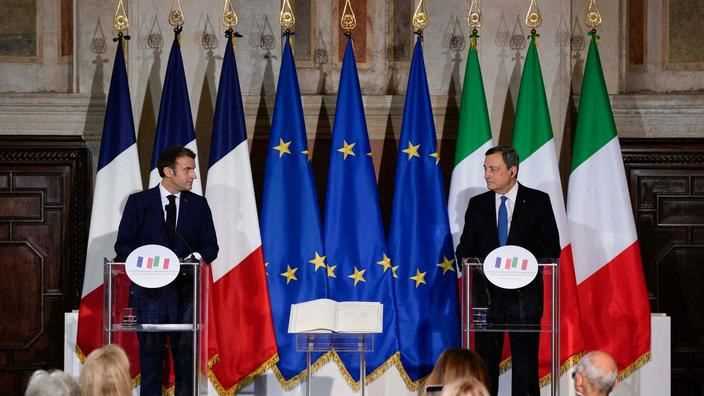“We must have more room for maneuver,” argue the two leaders in a column published on Thursday.
Emmanuel Macron and Mario Draghi call for reforming the euro zone’s “obscure and excessively complex” budgetary rules, to allow “the large-scale investments” that Europe needs. In a column co-signed in the Financial Times, the French President and the Italian Prime Minister urge their European counterparts to “meet the major challenges” facing them after the pandemic.
Read alsoEuropean Union: in Brussels, France is expected to have a president, not a candidate
On the table for months, the reform of the Maastricht criteria on a deficit of 3% of GDP maximum and a debt of 60% has become a priority of the French presidency of the Council of the European Union, in the first half of 2022. Emmanuel Macron and Mario Draghi want, as a first step, to try to reach a consensus on the investments necessary for the climate transition, digital or defense, before adapting the budgetary rules to these new strategic objectives.
This European “new growth model” invoked by the Head of State will be at the heart of an informal summit of the Twenty-Seven, on March 10 and 11. At the Élysée, we already pride ourselves on a “very widely shared vision” on this approach. want to make the reform of the Maastricht criteria one of the priorities of the French presidency of the EU, considering that the question of “for or against the 3%“Deficit was”outdated“. According to the Elysee, Emmanuel Macron is counting on the informal summit of heads of state and government of the EU to do “a quantified estimate of investment needs, and the rules that will have to evolve as a result, including competition and trade rules, but also European budgetary rules“,”which must be adapted to the challenges of the time“.
The Franco-Italian text was “shared” with the new German Chancellor, Olaf Scholz, without causing him to add his signature to it. “He has barely moved into his office,” explains one to the presidency. Since taking office, he has also visited Paris and Rome successively, where these questions have been discussed. The new coalition in the Netherlands, for its part, also underlined the need for new public investments for the future.
SEE ALSO – Macron press conference: The economic debrief
